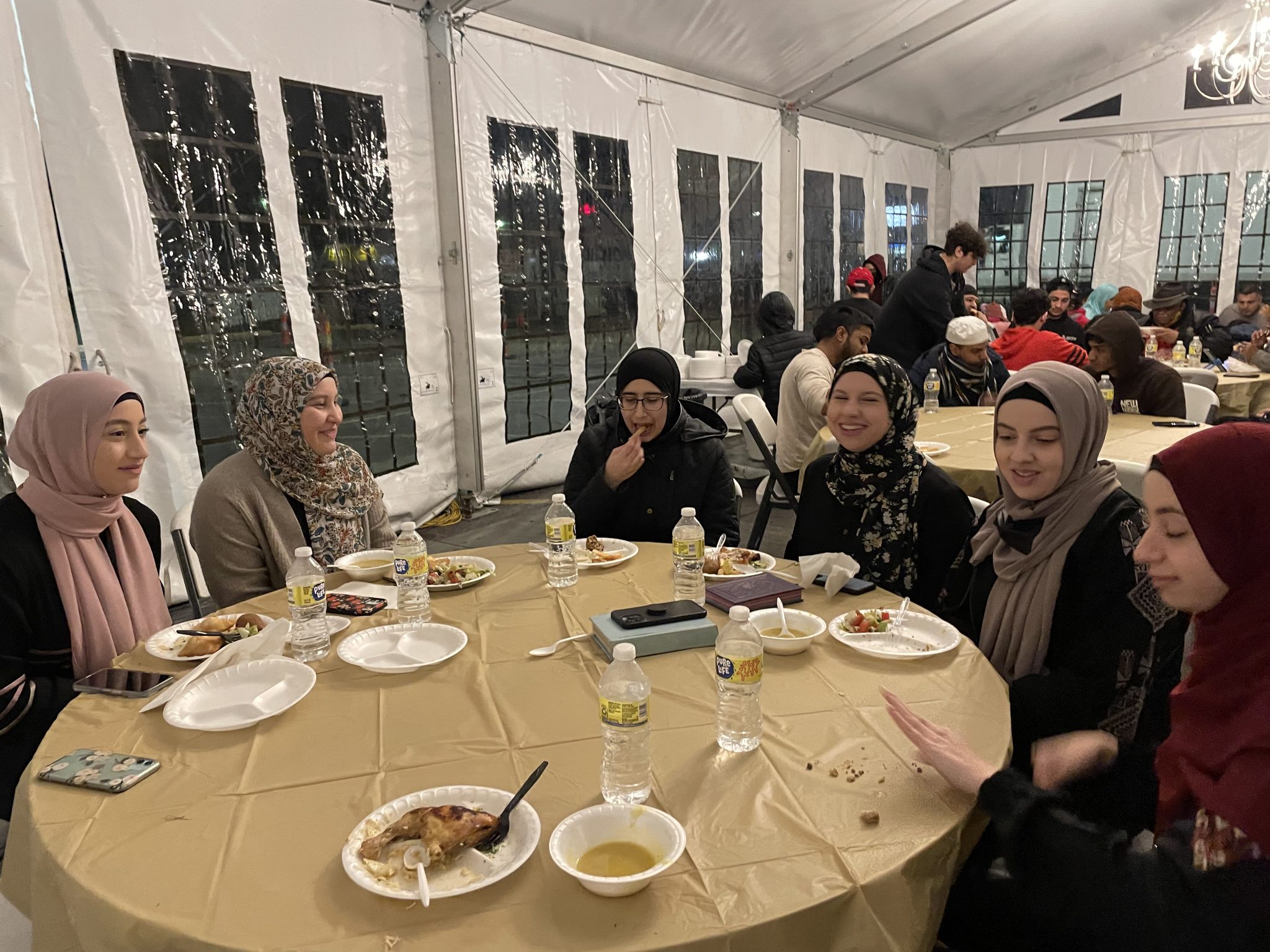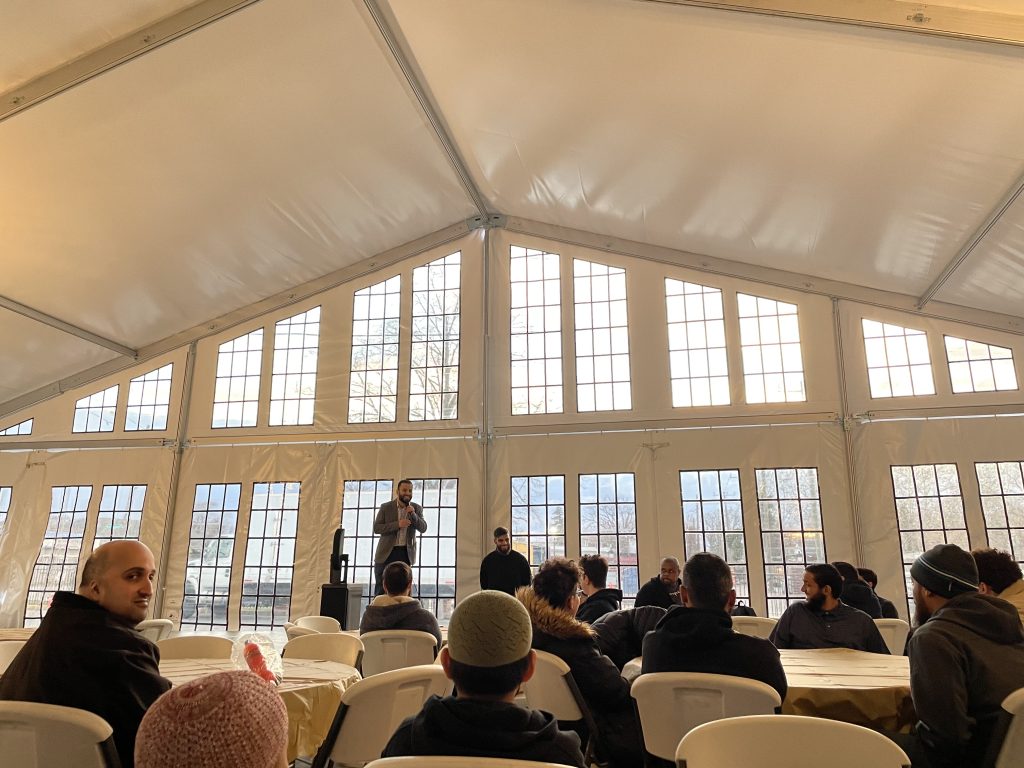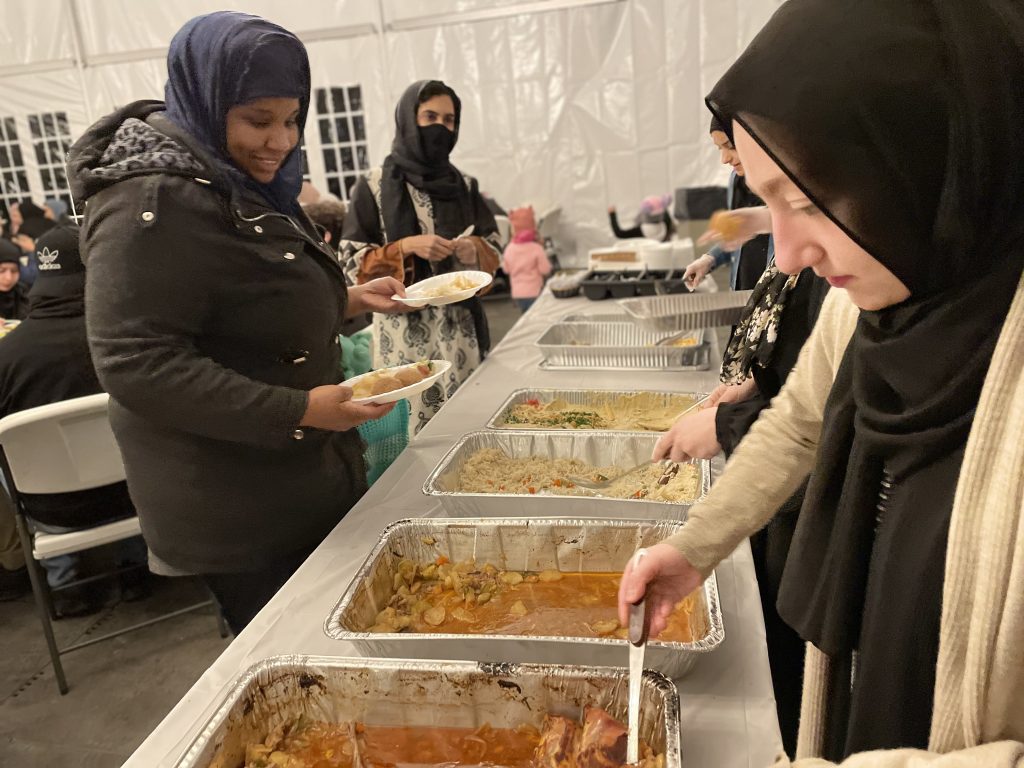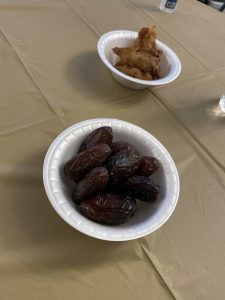Muslims Building Bridges unity iftars bring community together after two years of COVID-19
During Ramadan, Muslims Building Bridges works with mosques to host iftars that bring Muslims together across cultural and socioeconomic lines.

Volunteer Eman Saker (second from left) sits with other volunteers and participants at the Muslims Building Bridges unity iftar at the Islamic Center of Detroit.
During the first two years of the pandemic, Metro Detroiters had to forgo celebrating religious holidays with others. For American Muslims, that meant not participating in community Ramadan iftars, the meal to break fast. This year the organization Muslims Building Bridges resumed its “unity iftars” across mosques in Metro Detroit.
It’s a chilly Thursday night in Detroit. People are parking their cars and heading into an enormous tent — decked out with chandeliers – at the Islamic Center of Detroit on Tireman Road. It’s a mosque near the Detroit-Dearborn border.
As people make it to their seats, Dr. Mohannad Hakeem welcomes people into his home mosque.
“No matter where you go, no matter how much success you have, you always need this brotherhood and sisterhood and a sense of community,” he says.
Listen: Iftars bring Muslims across Metro Detroit together.

The Islamic Center – known as ICD — is one of five mosques hosting these unity iftars in Michigan. During Ramadan, Muslims Building Bridges works with mosques to host iftars that bring Muslims together across cultural and socioeconomic lines. An iftar is a post-sundown meal that breaks fast during Ramadan.
Inside the tent, people chatter with friends and strangers. Hakeem encourages people to get to know each other.
“So make sure that everyone knows everyone a little bit better about yourself, what you do,” he says.

Friends, families and people who just met will break their Ramadan fast together at sunset – their first meal since dawn.
Volunteers place sambusas — fried pastries stuffed with minced meat — dates and water bottles on the table. Another staffer plops a bottle of hand sanitizer in the middle, a reminder of how COVID-19 is changing in-person gatherings. Many attendees are masked.
Hakeem opens the floor for people to share stories. Then he says a prayer.
“We ask you to accept from us our fasting, our prayers, our charity, you’re asking for the enlighten our hearts, oh Allah,” he says.
“No matter where you go, no matter how much success you have, you always need this brotherhood and sisterhood and a sense of community.” —Dr. Mohannad Hakeem
As he says “ameen,” people break their fast with a date and a few sips of water, or sambusas.
Then they head into the mosque for maghrib, the prayer after sunset.
Inside the mosque, the imam leads maghrib. Congregants stand in rows praying shoulder to shoulder like they did in the days before COVID-19. During the pandemic, communal prayers were socially distant and people had to bring their own prayer mats. A few kids run in circles in the back rows of the mosque.
After prayer, everyone returns to the outdoor tents to have dinner. Two buffet lines are set up, women to the right and men to the left. Volunteers serve hefty portions of a variety of Middle Eastern foods. There’s chicken and rice, hummus and lentil soup. For desserts, there’s baklava — phyllo pastry with chopped nuts, soaked in honey — and basbousa, a semolina cake with simple syrup and pistachios.

Babar Qadri, the founder of Muslims Building Bridges, began the program 10 years ago when he noticed people did not go to each other’s mosques or did not feel welcome there. He wanted to change that. The iftars were put on pause for the last two years due to the pandemic.
“After two years, people are thirsty to get back together with the deen [practices of faith], to hug each other, to future to break bread with each other,” he says.
This year he wasn’t sure if he should resume the “iftar tours.”
“But so many people blew up my phone and were emailing me. ‘Brother Babar, are you going to do it again? Let’s do [Muslims Building Bridges], again, we want to do it again. We want to be a part of the tour,'” he says.
Qadri says people want to practice their faith together.
Karlecia Butler is one of the organizers for this year’s Muslims Building Bridges iftar. Butler says COVID-19 especially made it hard to observe Ramadan. She’s glad things are returning to in-person.

“Ramadan 2020 was so heartbreaking. And you know, it was not just heartbreaking for me as an individual. But our whole community was really sad. Everybody kept trying to find different ways to like, just have that human connection,” she says.
Eman Saker is one of the volunteers. She’s been a part of the Islamic Center of Detroit youth committee for eight years. She says the mosque hosts local events such as iftars, lectures and workshops, with a focus on spiritual, physical and mental health well-being.
Saker says this is the first community iftar held at ICD since the pandemic.
“We don’t usually connect with a lot of other communities out on a regular basis. So this is one event that’s in the calendar year that we already have set and that we come together for everyone. So, it’s nice to see all the new faces and introduce them to ICD and what we do,” she says.
Attendee Khadega Mohammed hopes to visit a different mosque each night.
“There are so many different communities that I have yet to tap into. And for me, I just have this curiosity about the world and the people in it and specifically about Muslims because we are united despite like being so different,” she says.
Mohammed says Ramadan is also an opportunity for people of other faiths to learn about Islam and Muslims.
Related: A guide to where to celebrate Eid this year.
“I think during this month, people are a lot more generous, a lot more giving. And I want people outside of this religion to truly experience that. And that’s why like, I have my friend who’s not Muslim. She comes with me every night to the mosque, and she thoroughly enjoys this environment,” she says.
Qadri says he wants to see the program expand to interfaith iftars. He hopes that something as simple as breaking bread together will open the door for richer conversations and understanding.
Trusted, accurate, up-to-date.
WDET strives to make our journalism accessible to everyone. As a public media institution, we maintain our journalistic integrity through independent support from readers like you. If you value WDET as your source of news, music and conversation, please make a gift today.
